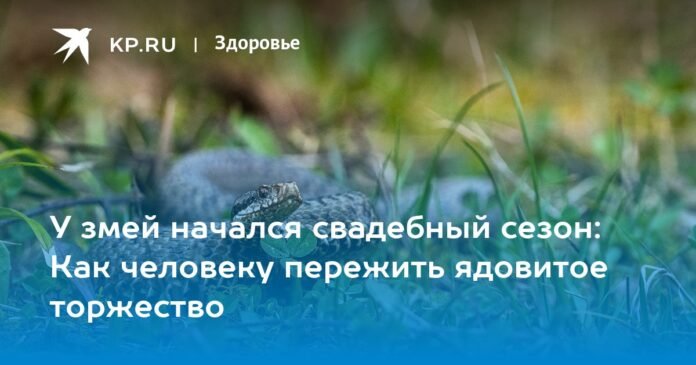The end of June-beginning of July is the time for snake weddings.
Photo: Shutterstock
Biological Sciences candidate Pavel Glazkov said that during the mating season, a female can meet 4-7 males and then lay fertilized eggs for five years without the need for males.
“During this period, snakes are not aggressive,” Pavel Glazkov debunks the main myth. – Of course, if you don’t touch them, don’t step on a ball of snakes and don’t try to shake them. Usually, Snakes are too busy with each other and do not pay attention to people.
In general, snakes try not to attack people, preferring to move away if they see or hear a person walking calmly. But if you go right at them and very fast, they may attack, considering this aggression.
– Approximately in August, vipers begin to give birth to vipers, and these small vipers are very dangerous, they protect their lives and can attack, – explained the biologist. – And snakes are poisonous from birth. The second dangerous time is late fall, before winter, when the vipers begin to gather before wintering. They defend their sleeping area and can become aggressive. It is better to avoid such tangles.
WHEN GOING TO THE FOREST, DON’T FORGET THE RULES
1. When going to the forest for mushrooms or berries, always wear rubber boots! The vipers bite in the ankle, the boot will be saved.
2. All snakes love to bask in the sun. Therefore, when you go out into a forest glade or a sunlit glade, carefully look around so as not to accidentally step on a basking snake.
3. If you go to the meadow, to the tall grass, move in front of you with a stick: snakes usually prefer to move away when they hear a noise.
4. If you meet a snake head on, don’t run, try not to provoke it with sudden movements. The snake, as a rule, will voluntarily get out of your way.
WHAT TO DO IF YOU HAVE BEEN BITTEN BY A SNAKE
– First you need to understand that both poisonous and non-poisonous snakes can bite. So it’s important, if you’ve been bitten by a snake, to try to take a photo of the snake, he said on the show “Live Great!” professor, immunologist Andrei Prodeus. – A photo is required when prescribing therapy. In central Russia, the only poisonous snake lives – the viper. When a viper bites, it releases venom that can destroy tissue. This is the main problem. If we see that there is a swelling at the bite site and two red dots from the teeth of a snake, then most likely it was a viper. Rules:
1. DO NOT suck the poison: so that the person helping can swallow a part of the poison, and in general it is easily absorbed through the mucous membranes. Then there will be two poisoned: the victim and the assistant.
2. DO NOT bandage the bite site with a tourniquet. “The viper’s venom, when concentrated, strongly destroys tissues, so it would be more correct to let it through the body – then the concentration of the poison will be less, its effect will be weaker,” explains Andrey Prodeus.
That is, a tourniquet over the bite site can provoke not only blood stasis and tissue inflammation, but also gangrenous phenomena and will only increase the risk of death.
3. DO NOT cauterize! “Superficial exposure to a hot object cannot reduce the effect of the poison that has penetrated the blood, but at the same time, a burn can also be added to the bite,” Timur Asanov, general practitioner of the Vidnovskaya Regional. Clinical Hospital, warns.
The main thing – do not panic, let the bitten drink as much water as possible – it removes toxins and reduces the concentration of itself in the blood. Try to arrange it in a quiet place. And urgently call an ambulance!
Or, if the person feels fine, take them to the nearest emergency room.

